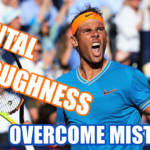Tennis mistakes happen… Making mistakes in tennis is normal and it is important to have mental toughness to overcome those mistakes. It doesn’t matter your level, total beginners to tour players, mistakes are unavoidable and happen all the time. Every sport whether its basketball, baseball, or golf missing happens. What is more shocking is how […]
Tennis Psychology - Keys to Mental Toughness & Entering the Zone
In this section you will find information based on general and sports psychology as it applies to tennis. How understanding the principles of tennis psychology and applying them daily can help a player develop mental toughness and become more proficient at entering the zone.
General and sports psychology branches out to all sports not just tennis. So, we will cover individuals and situations that we can learn from and apply the lessons to fit our tennis needs.
Tennis Psychology Topics
Controlling Thoughts
To play tennis optimally players need to become more aware of their thoughts and begin to control their thinking. Thoughts can impact a player physically feels and mentally handles situations. By being aware of ones thoughts a player can begin to control which thoughts he allows to enter his mind. By doing so overtime a player can become a more positive and solution based thinker.
Heightened Focus
During the course of a tennis match players can get upset over factors that are out of their control. It happens often, complaining about the wind, sun, shade, noise, courts and the list goes on. This negatively impacts a players focus and ability to play their best tennis.
Instead a player can positively influence their level of play by focusing on what is in their control. Tennis players can control their pre match preparation, having everything necessary to perform at their best, such as their diet, rest, equipment, and on court necessities. A player can control his psychology, starting with his attitude, effort, ability to let things go, and his on court strategy.
Controlling Arousal
Controlling arousal levels for tennis players to perform at their best is important. In tennis psychology many athletes talk about entering the zone. Part of controlling arousal, to manage intensity and body energy, is to center yourself so you can heighten your focus and immerse yourself in what you are doing. Having arousal levels that are too high or too low can negatively impact decision making.
Using Visualization
Learning how to use visualization is useful for all aspects of tennis. When it comes to tennis psychology, visualization is used for mental preparation, achieving a desired outcome and as a tool to forget about a mistake by focusing on the imagery of the desired outcome.
Building Confidence
Having confidence is vital to every tennis player’s success. A confident player often builds mental toughness overtime. Meaning he doesn’t give up when a challenge appears and believes in himself and his abilities in spite of the situation.
Tennis psychology can quickly help a player that lacks confidence. Signs of lacking confidence include hesitating to make line calls, playing over cautiously and tanking tennis matches.
Addressing Limiting Beliefs
A limiting belief is when a tennis player ties a specific scenario to a predetermined outcome. An example of this is when a player believes he plays poorly in matches that go three sets. Limiting beliefs often reside in the subconscious and can take time to discover. They are important to address to prevent self-sabotage.
By eliminating limiting beliefs tennis players can be at peace when they play. They can accept what happens and it is what it is, nothing more.
Entering the Zone
The zone is the state of mind where the brain makes the switch from the conscious state to the sub conscious state resulting in optimal performance while performing an activity. Being in the zone is when we feel our best and play our best tennis. Some athletes find the zone more than others and we will look into how they do it.
By constantly putting these tennis psychology tools into practice, tennis players can improve their mental toughness and enjoyment of the game.
If you have suggestions for topics centering around tennis psychology, please don't hesitate to contact me and let me know.



